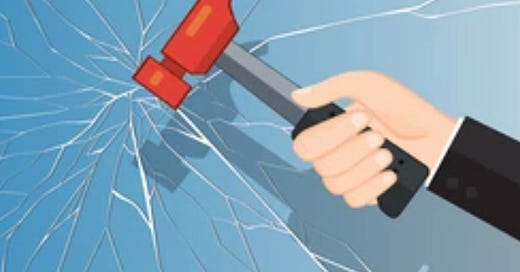There’s a lot of concern that the Federal Reserve is going to keep raising interest rates until it forces something to “break.” I share that concern.
If you follow financial markets, then you’ve undoubtedly heard people like Scott Minerd say that he thinks the Fed will continue with rate increases until “something breaks.” He’s been arguing for some time that the Fed is steering us into a crisis by relying on backward-looking price (and other) signals for guidance about the underlying strength of the US economy. He’s worried that if the Fed keeps tightening the way markets currently anticipate, then it will trigger an “accident” that could “spill over into the financial markets.”
San Francisco Federal Reserve President Mary Daly has dismissed those concerns, insisting:
We definitely don't raise rates until something breaks; we actually are forward-looking.
As Daly (rightly) notes, the Fed doesn’t simply plug some historical data into some kind of Taylor-Rule model when deciding on its next policy move. Still, Powell & Co. appear committed to staying the course—downplaying financial risks and mounting evidence that it has done enough—by vowing to “keep at it” even if it means hiking into a recession.
This uber-hawkish Fed has a lot of people worried, including the IMF and the United Nations Conference on Trade and Development (UNCTAD), the World Bank.
My friend, CNBC contributor Ron Insana, agrees. He points to the recent turmoil in UK gilt markets but says:
We are on the cusp of an even bigger break in the global financial architecture as Federal Reserve officials are now doubling down on the need to raise rates to fight what appears to be falling inflation, irrespective of the consequences.
Ron reminds us that excessive rate hikes won’t just “break something” in the US economy—the labor market, housing, commercial real estate, the stock market, etc. The breakage will spill over onto the rest of the world:
Volcker’s draconian policies…came with an associated and unanticipated cost even beyond the deep double-dip recession that ensued.
Rapidly rising rates in the U.S. put a strain on Latin American nations which had borrowed considerable amounts of money from U.S. commercial banks throughout the 1970s.
Those debts, largely denominated in dollars, were hammered by a combination of higher rates and falling domestic currency values, effectively and substantially increasing the debt service burden on those nations.
As rates rose sharply, Latin American nations threatened to default on their outstanding debts, an event that could have rendered many U.S. money center banks, effectively, insolvent. Volcker had no choice but to stop raising rates and start cutting them to relieve the strains on the U.S. banking system.
So, even under those circumstances the Fed raised rates until something broke…
If history is any guide, and in financial markets it almost always is, the Fed will be forced to pause, if not pivot, on policy in the relatively near future.
They may deny it. They may not want to do it. They may refuse to even acknowledge the possibility of such a drastic change in policy.
But change they will.
I’m with Ron.




Even if the Fed stops raising rates before it breaks something, it can do a lot of damage especially to those (individuals, nations) who have the least resources to recover. Volcker, from what I’ve read, is Powell’s hero. Does not bode well.
Rates have been artificially low for such a long time, maybe we think that is the norm? And by low, I mean the zero to 1% neighborhood. Don't the rates need to come back to something that makes some sense? Nobody really saves in a savings account or a CD anymore. All monies are chased into equities, and that market is completely overvalued now. I have no idea what these low rates have done to bond markets. I'd like to hear Stephanie's take on permanently low interest rates.